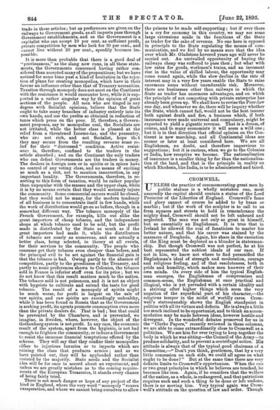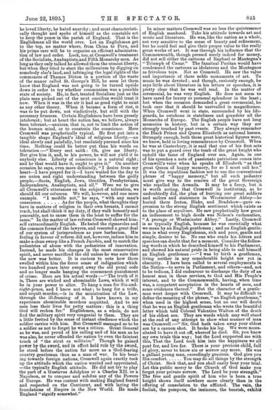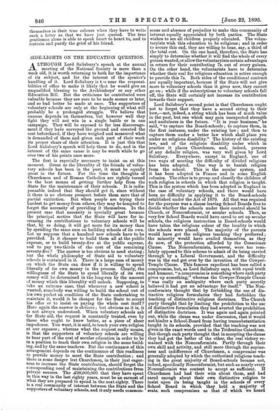CROMWELL. U NLESS the practice of commemorating great men by public
statues is a wholly mistaken one, most assuredly the capital should contain a statue of the Lord Protector of the Liberties of England. Cromwell's fame and glory cannot of course be added to by brass or marble ; but if the work of the sculptor is to call to us from squares and streets to hold in remembrance the mighty dead, Cromwell should not be left unheard and neglected. The man was not only so great in himself, but so essentially an Englishman. It is true that in Ireland he allowed the zeal of fanaticism to master his better nature, and that his career was stained by the massacre of Drogheda. Again, his share in the execution of the King must be deplored as a blunder in statesman- ship. But though Cromwell was not perfect, he at his best represented the noblest ideals of our race. If not in him, we know not where to find personified the Englishman's ideal of strength and moderation, courage and religious feeling, and of that resoluteness, both in pride and humility, which makes men knowers of their own minds. On every side of him the typical English- man emerges, the Englishman of compromises and common-sense, the Englishman at once practical and illogical, who is yet pervaded with a certain ideality and a striving after higher things which seem the very negation of the superficial part of his character,—the religious temper in the midst of worldly cares. Crom- well's statesmanship shows the English standpoint in politics with all its virtues and defects. He is always a little too much inclined to be opportunist; and to think an accom- modation may be made between ideas, however hostile and divergent. In the wonderful debates preserved for us in the " Clarke Papers," recently reviewed in these columns, we are able to come extraordinarily close to Cromwell as a politician. We see him for ever trying to keep together the body in which he was sitting—the Council of the Army—to produce solidarity, and to prevent a centrifugal action. His attitude is always that of the typical good chairman of a Committee,—" Don't you think, gentlemen, that by a very little concession on each side, we could all agree on what ought to be done ?" But at the same time there are very definite limits to Cromwell's opportunism. When the one or two great principles in which he believes are touched, he becomes like iron. Again, if he considers that the welfare of the nation, as a whole, is endangered, and that patriotism requires such and such a thing to be done or left undone, there is no moving him. Very typical again was Crom- well's attitude on the question of law and order. Though he loved liberty, he hated anarchy ; and most characteristi- cally thought and spoke of himself as the constable set to keep the peace in the parish of England. That is the Englishman all the world over. Let an Englishman get to the top, no matter where, from China to Peru, and his prime care will be to organise an efficient administra- tion of law and order. Look, too, at Cromwell's treatment of the Socialists, Anabaptists, and Fifth Monarchy men. As long as they only talked he allowed them the utmost liberty, but when they tried to start the millennium by digging on somebody else's land, and infringing the legal rights of the commoners of Thames Ditton in a portion of the waste of the manor called St. George's Hill, he soon let them know that England was not going to be turned upside down in order to try whether communism was a possible state of society. He, in fact, treated Socialism just as the plain man picked out of the next omnibus would treat it now. When it was in the air it had as good right to exist as any other theory. When it became a form of riot, it was to be put down, not vindictively, but still with the necessary firmness. Certain Englishmen have been grossly intolerant; but at heart the nation has, we believe, always been tolerant,—anxious, that is, not to limit the action of the human mind, or to constrain the conscience. Here Cromwell was prophetically typical. He first put into a tangible shape England's ideal of religious liberty,—an ideal slowly and painfully, but resolutely pursued since his time. Nothing could be better put than his words on toleration :—" Every sect saith : Oh, give me liberty. But give him it, and, to his power, he will not yield it to anybody else. Liberty of conscience is a natural right ; and he that would have it, ought to give it." On another occasion he says, even more definitely, "I desire from my heart—I have prayed for it—I have waited for the day to see union and right understanding between the godly people,—Scots, English, Jews, Gentiles, Presbyterians, Independents, Anabaptists, and all." Were we to give all Cromwell's utterances on the subject of toleration, we should fill our columns. We will, however, add one more example. " I meddle not," he says, " with any man's conscience As for the people, what thoughts they have in matters of religion in their own breasts, I cannot reach, but shall think it my duty, if they walk honestly and peaceably, not to cause them in the least to suffer for the same." In the matter of law-reform Cromwell showed him- self extraordinarily English. He hated the rigmaroles and the common forms of the lawyers, and resented a great deal of our system of jurisprudence as pure barbarism. His feeling in favour of reform did not, however, induce him to make a clean sweep like a French Jacobin, and to match the pedantries of abuse with the pedantries of innovation. Instead, he made his changes in the most conservative spirit, and never sacrificed the old unless he was sure that the new was better. It is curious to note how there swelled within him the fierce sense of indignation which two hundred years later swept away the old penal code and no longer made hanging the commonest punishment of crime. Here are his actual words :—" The truth of it is, There are wicked and abominable Laws, which it will be in your power to alter. To hang a man for Six-and- eight-pence, and I know not what ; to hang for a trifle, and acquit murder,—is in the ministration of the Law, through the ill-framing of it. I have known in my experience abominable murders acquitted. And to see men lose their lives for petty matters : this is a thing God will reckon for." Englishmen, as a whole, do not find the military spirit very congenial to them. They are a little fretted by the sense of instant obedience which the soldier carries with him. But Cromwell managed so to be a. soldier as not to forget he was a citizen. Great General as he was, and proud of his calling and of his men as he was also, he never offended the nation by even the faintest touch of " the strut en militaire." Though he gained power by the sword, and in effect held rule by the sword, he stood before the nation far more as a God-fearing country gentleman than as a man of war. In his bear- ing towards foreign nations, Cromwell again exactly took up the attitude which the nation wanted and appreciated, —the typically English attitude. He did not try to play the part of a Gustavus Adolphus or a. Charles XII. or a Napoleon, or to conquer and subdue any of the Powers of Europe. He was content with making England feared and respected on the Continent, and with laying the foundations of Empire in the New World. He made England "signify somewhat." In minor matters Cromwell was no less the quintessence of English manhood. Take his attitude towards art and music and literature. He was, like the nation as a whole, not very sensitive to the sense of beauty and refinement, but be could feel and give their proper value to the really great works of art. It was through his influence that the Commonwealth, though pressed sorely indeed for money, did not sell either the cartoons of Raphael or Mantegna's " Triumph of Caesar." The fanatical Puritan would have condemned the cartoons as idolatrous and the Mantegnas as frivolous toys. Not so Cromwell. He saw the vague and importance of these noble monuments of art. To music he was devoted ; and though, curiously enough, he says little about literature in his letters or speeches, it is pretty clear that he was well read. In the matter of ceremonial, he was very English. He does not seem to have cared for luxury or personal splendour in the least ; but when the occasion demanded a great ceremonial, he took care that it should be unrivalled in magnificence. When Cromwell went in state, surrounded by his life- guards, he outshone in stateliness and grandeur all the Monarchs of Europe. The English people have not long memories in history, but in a certain way they are strongly touched by past events. They always remember the Black Prince and Queen Elizabeth as national heroes. Strangely enough, both these great historical figures were, we know, held in loving remembrance by Cromwell. When he was at Canterbury, it is said that one of his first acts was to put a guard over the tomb of the great knight who upheld the fame of England over sea. Again, in one of his speeches a note of passionate patriotism comes into Cromwell's voice when he speaks of Elizabeth " as that great Queen of happy memory, for so I must call her." It was the republican fashion not to use the conventional phrase of "happy memory," but all such pedantry must give way to the renown of the great Sovereign who repelled the Armada. It may be a fancy, but it is worth noting, that Cromwell in instituting, as he undoubtedly did, the plan of burying our great soldiers and sailors and statesmen in Westminster Abbey—he buried there Ireton, Blake, and Bradshaw—gave ex- pression to the strong English sentiment which exists as to the place of sepulture. He saw prophetically how great an inducement to high deeds was Nelson's exclamation, "A peerage or Westminster Abbey." Lastly, Cromwell is so typically English, because he was essentially what we mean by an English gentleman ; and an English gentle- man is what every Englishman, rich and poor, gentle and simple, desires to be. No one who reads his letters and speeches can doubt that for a moment. Consider the follow- ing words in which he described himself to his Parliament, and showed his natural pride in being able to call himself an English gentleman :—" I was by birth a gentleman, living neither in any considerable height nor yet in obscurity. I have been called to several employments in the Nation—to serve in Parliament, and others—and, not to be tedious, I did endeavour to discharge the duty of an honest man in those services, to God and His People's interest, and to the Commonwealth, having, when time was, a competent acceptation in the hearts of men, and some evidences thereof." But the character of a gentle- man went deeper with Cromwell. It may be difficult to define the meaning of the phrase, "an English gentleman," when used in the highest sense, but no one will doubt that he was an English gentleman who wrote the beautiful letter which told Colonel Valentine Walton of the death of his eldest son. They are words which may well stand at the end of any attempt to show what manner of man was Cromwell :— Sir, God bath taken away your eldest son by a cannon shot. It broke his leg. We were neces- sitated to have it cut off, whereof he died. Sir, you know my own trials this way ; but the Lord supported me with this, That the Lord took him into the happiness we all pant for, and live for. There is your precious child, full of glory, never to know sin or sorrow any more. He was a gallant young man, exceedingly gracious. God give you Ms comfort You may do all things by the strength of Christ. Seek that, and you shall easily bear your trial. Let this public mercy to the Church of God make you forgot your private sorrow. The Lord be your strength." The free and gentle spirit of him who is born a true knight shows itself nowhere more clearly than in the offering of consolation to the afflicted. The vain, the foolish, the pompons, the insincere, the boorish, exhibit themselves in their true colours when they have to write such a letter as that we have just quoted. The true gentleman alone is able to speak heart to heart to, and to restrain and purify the grief of his friend.




































 Previous page
Previous page